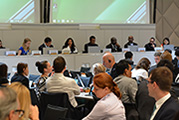MORE:
> Experience sharing on establishing or maintaining a national committee on Trade Facilitation
Concluded in December 2013, the TFA contains provisions for expediting the movement, release and clearance of goods, including goods in transit. It also sets out measures for effective cooperation between Customs and other appropriate authorities on trade facilitation and Customs compliance issues. It further contains provisions for technical assistance and capacity building in this area.
Article 23.2 of the TFA provides that each WTO member shall establish and/or maintain a national committee on trade facilitation or designate an existing mechanism to facilitate both domestic coordination and implementation of the Agreement. Although the requirements of the TFA are relatively straightforward, some WTO members have found it difficult to determine how best to structure a national committee and to identify the key issues that need to be taken into account. A survey by the WTO Secretariat confirmed that considerable work is being done by members in this area.
“We have been registering a significant amount of attention on the issue of national TF committees — and demand for related guidance — for a considerable amount of time,” Ambassador Esteban Conejos of the Philippines, the chairman of the WTO’s Preparatory Committee on Trade Facilitation (PCTF), told participants. “What was meant to be a pretty straightforward provision in the Trade Facilitation Agreement … proved to raise several questions when faced with the task of implementing it on the ground.”
The TFA will enter into force when two-thirds of the WTO membership has accepted the Agreement. To date, 81 WTO members have ratified the TFA, representing 75 per cent of the acceptances needed.
Officials from government agencies involved in developing strategies to create or establish national committees outlined their experiences in drafting the mandates, defining the institutional frameworks and goals, and ensuring the proper functioning of such committees. Representatives from donor agencies and international organizations also outlined how to obtain assistance to set up and maintain the national committees.
The officials came from Brazil, St. Vincent and the Grenadines, Uganda, Vanuatu, Albania, Botswana, Costa Rica, Fiji, Jamaica, the Netherlands, Nigeria, Pakistan, Viet Nam, Ghana, Paraguay, Papua New Guinea, Tajikistan, Sweden, Guyana and Laos. Most of these members already have national trade facilitation committees in place or are in the process of setting one up.
A common theme which emerged from the interventions was the importance of private sector involvement in the establishment and work of the national committees, particularly representatives from small and medium-sized enterprises, as business is directly affected by the Customs bottlenecks and red tape which the TFA seeks to address. Another common theme was the need for coordination between government ministries and agencies with a role in TFA implementation.
Summing up the discussions, Amb. Conejos said that while members often face common challenges, they have chosen different ways of approaching the task of establishing or maintaining a national committee “and for good reason, as one size will never fit all”.
Nevertheless, the experiences of members so far shows that “having clear and measurable tasks, achieving early results to show that the committee can deliver, as well as securing consistent engagement and high political support emerged as important conditions for a committee to well perform its role,” he said.
“An inclusive approach to committee composition, allowing all stakeholders — including different stakeholders in the private sector — to take part, appears to be an important success factor as well,” he added.
> Problems viewing this page?
Please contact [email protected] giving details of the operating system and web browser you are using.

